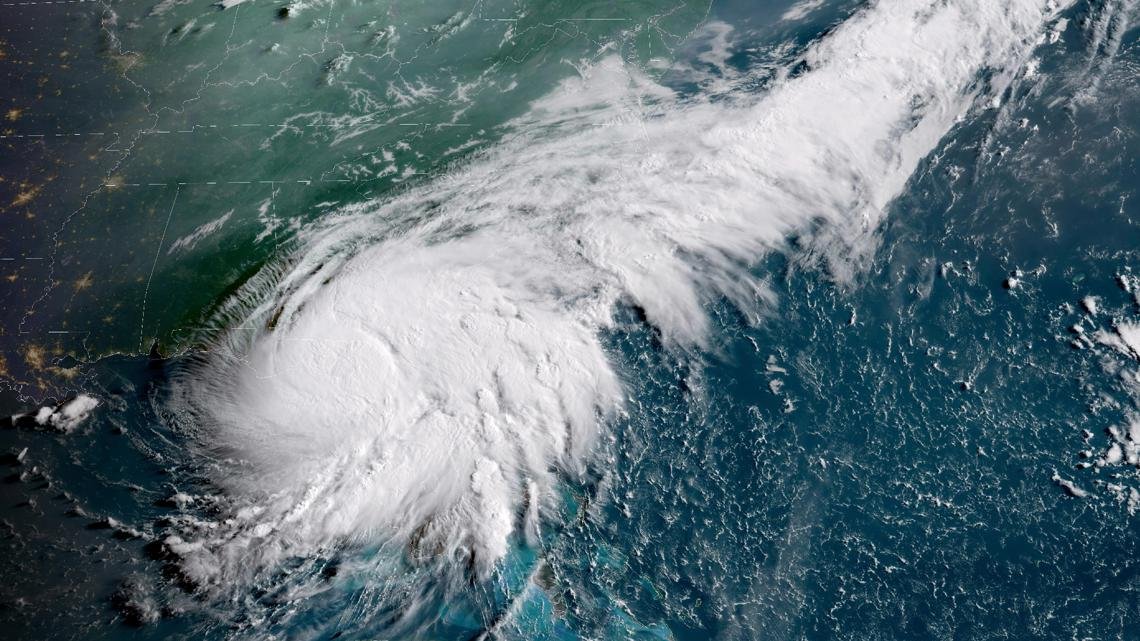Entertainment
Torrential Torrents: Slow-Moving Tropical Storm Debby Drenches Southeastern US with Floods

At least five people were killed Monday as Tropical Storm Debby made landfall, marking it as a “historic and potentially unprecedented event,” officials said.
HORSESHOE BEACH, Fla. — Tropical Storm Debby moved menacingly into some of America’s most historic Southern cities, bringing prolonged downpours and flooding throughout the day Tuesday after slamming into Florida and prompting the rescue of hundreds from flooded homes.
Record-setting rain from the storm that killed at least five people was causing flash flooding, with up to 30 inches (76 centimeters) possible in some areas, according to the National Hurricane Center.
The storm’s center was over southeast Georgia early Tuesday, with maximum sustained winds near 45 mph (75 kph). It was moving northeast at about 7 mph (11 kph). The center is expected to move off Georgia’s coast later Tuesday, with some strengthening forecast Wednesday and Thursday before it moves inland over South Carolina on Thursday.
“Hunker down,” Van Johnson, the mayor of Savannah, Georgia, told residents in a social media livestream Monday night. “Expect that it will be a rough day” on Tuesday, he added.
More than 6 inches (15 centimeters) of rain had fallen through Monday at Savannah’s airport, with additional rainfall continuing into Tuesday, the National Weather Service reported. Flash flood warnings were issued in Savannah, Georgia, and Charleston, South Carolina, among other coastal areas.
South Carolina’s Charleston County Interim Emergency Director Ben Webster called Debby a “historic and potentially unprecedented event” repeatedly in a short briefing Monday. The city of Charleston’s emergency plan includes sandbags for residents, opening parking garages, and an online mapping system showing closed roads due to flooding.
In Edisto Beach, South Carolina, a tornado touched down Monday night, damaging trees, homes, and power lines, according to the Colleton County Sheriff’s Office. No injuries were immediately reported.
Debby made landfall along the Gulf Coast of Florida early Monday as a Category 1 hurricane before weakening to a tropical storm. It brought catastrophic flooding across portions of eastern Georgia, coastal South Carolina, and southeast North Carolina through Wednesday.
Around 500 people were rescued Monday from flooded homes in Sarasota, Florida, and 186 people were rescued from flood waters in Manatee County nearby.
Florida Gov. Ron DeSantis warned of ongoing threats as waterways north of the state continue to fill up and flow south. “It is a very saturating, wet storm,” he said, expressing concern for the days to come.
The storm claimed five lives, including a truck driver on Interstate 75 near Tampa and a 13-year-old boy in Gainesville, Florida, among others.
More than 140,000 customers were without power in Florida and Georgia on Tuesday morning, down from a peak of over 350,000. Nearly 12,000 more were without power in South Carolina.
Over 1,600 flights were canceled nationwide on Monday, with more than 550 flights canceled early Tuesday, primarily affecting Florida airports.
President Joe Biden approved emergency declarations for South Carolina, following a similar request for Florida. Georgia Gov. Brian Kemp has also requested a preemptive federal emergency declaration.
Vice President Kamala Harris postponed a campaign stop in Savannah scheduled for Thursday. In North Carolina, Gov. Roy Cooper declared a state of emergency, with several coastal areas prone to flooding, such as Wilmington and the Outer Banks.
North Carolina and South Carolina have suffered three catastrophic floods from tropical systems over the past nine years, each causing more than $1 billion in damage. In 2015, rainfall fed by Hurricane Joaquin brought massive flooding. In 2016, Hurricane Matthew resulted in 24 deaths and record river crests. Hurricane Florence in 2018 broke those records, causing 42 deaths in North Carolina and nine in South Carolina.
Martin reported from Atlanta. AP journalists Freida Frisaro in Fort Lauderdale, Florida; Kate Payne in Tallahassee, Florida; Michael Schneider in Orlando, Florida; Russ Bynum in Savannah, Georgia; Jeffrey Collins in Columbia, South Carolina; Darlene Superville and Will Weissert in Washington, and Lisa Baumann in Bellingham, Washington, contributed to this report.


















